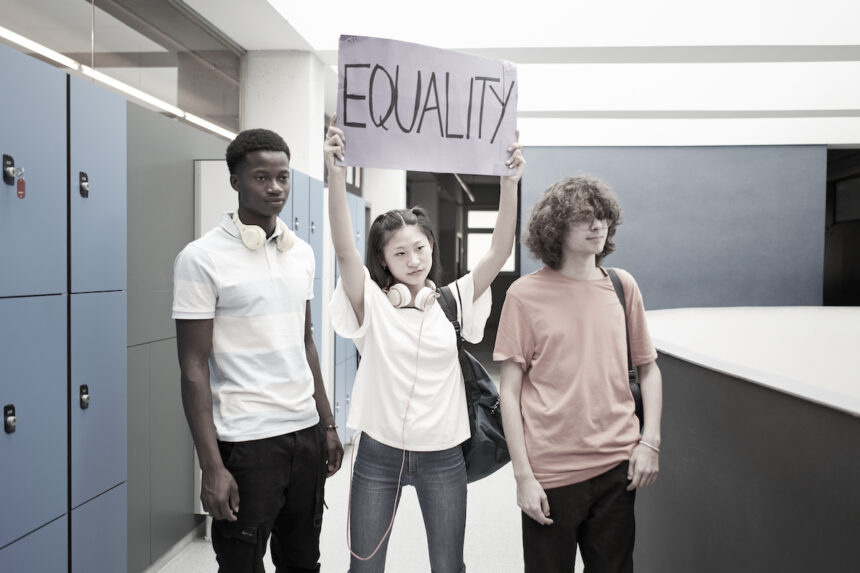In recent years, the conversation surrounding gender equality in United States has predominantly focused on the challenges faced by women in society. However, it is essential to acknowledge that men also experience unique struggles and inequalities that warrant attention and discussion. As we strive towards achieving a more equitable world for all, it is crucial to consider multiple perspectives on this issue. One such perspective comes from an insightful and thought-provoking paper titled “Gender Inequality: A Male Perspective,” which sheds light on the often-overlooked issues men face and the importance of addressing them in our pursuit of social justice and fairness.
A boys spoke up for Gender Equality in United States
In the paper titled “Gender Inequality: A Male Perspective,” an eighth-grade student, Jordan Williams, argues that while addressing gender inequality against women, the male side of the spectrum has been largely ignored. Williams highlights areas where males experience inequality, such as education, the court of law, and healthcare. He cites a study published in the Journal of Human Resources, which found that boys receive lower proficiency scores than their test scores would predict, largely due to biases in grading and discipline. Additionally, he quotes sociologist Jayanti Owens, who said, “the same behaviour problems in boys and girls were penalised a lot more in boys than girls.”
The paper also emphasizes gender bias in the judicial system. Williams refers to a 2012 article by law professor Sonja Starr, which noted that “men receive 63% longer sentences on average than women do,” and “women are twice as likely to avoid incarceration if convicted.” He also mentions the increasing gender bias in custody battles, where “in 2020, that number rose to 90 per cent,” showing that men lose custody of their children in the vast majority of divorces. The paper further discusses discrimination in healthcare, where “there is more money spent on breast cancer than lung cancer and prostate cancer combined,” even though lung cancer has a significantly higher fatality rate.
In conclusion, the paper argues that the quest for gender equality should not marginalize one gender at the expense of the other. Williams calls for fair treatment in education, the judicial system, and healthcare, asserting that “the needs of males need to be equally as important” as those of females to achieve true gender equality.
How are people thinking about Gender Equality in United States?
The comments on the paper express a variety of sentiments. Some commenters commend the author for addressing the topic, while others provide additional perspectives on the issue of gender bias in education. A few notable comments include:
Khalid Wasi: “I am your fan already, you have seen the tip of the iceberg, masculinity has been under attack for decades with too few willing to write about it.“
OreoObserver: “Great work and keep bringing up this topic because boys are being left behind in this increasingly female dominated world.“
Sessy: “What an articulate and well-written article. Though I disagree with some of your sources and conclusions, it is important to have this discussion in an intelligent and unbiased forum.“
Jamie MW: “Sir, you are correct, sexism does suck. As does racism, or any other form of systemic discrimination. Just be careful not to fall into the trap of an aggrieved member of a privileged group.“
George Patton: “My observation, after 74 years on the planet, is that girls and women are just plain smarter on average than boys and men. Now that the yoke of male misogyny has been largely lifted, women are going to be running the world. You are still young. Better get used to the idea!“
Overall, the comments reflect a range of views on the topic, with some agreeing that gender bias is an issue in education, and others expressing concerns about the sources used or providing their own perspectives on the matter.
Heros behind true Gender Equality in United States
In his recent commentary article, Edward Tavares praises eighth-grader Jordan Williams for his opinion article on gender inequality and its impact on men. Tavares emphasizes the importance of addressing these issues to create a more equitable society for all. He highlights the success of Kentucky’s Presumption of Equal Shared Parenting law enacted in 2018, which has led to a decrease in various family-related issues, including domestic violence.
Tavares points out that Bermuda’s politicians and some women’s organizations have expressed concern about the increase in domestic violence, which he believes is linked to the treatment of fathers and men in the country. He cites research that shows men and women perpetrate intimate partner violence at roughly equivalent rates and argues that the false narrative surrounding domestic violence can be damaging.
ChildWatch Bermuda advocates for the adoption of a Presumption of Equal Shared Parenting Law, which they believe would be in the best interest of the children. Tavares is critical of the revised “No-Fault Divorce Law,” stating that it does not protect children from losing contact with one of their parents, thus hampering their chances of success in life. He urges those in power to consider the empirical research and implement changes that will benefit children and families.


